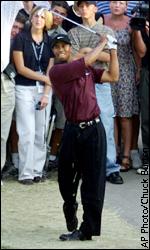Associated Press
Monday, August 21
LOUISVILLE, Ky. -- The only question left for Tiger Woods in major championships might be how he wins them.
 | |
| Tiger Woods' fifth major title was certainly his toughest. |
ESPN.com: Help | Advertiser Info | Contact Us | Tools | Site Map | Jobs at ESPN.com
Copyright ©2000 ESPN Internet Ventures. Terms of Use and Privacy Policy and Safety Information are applicable to this site.
